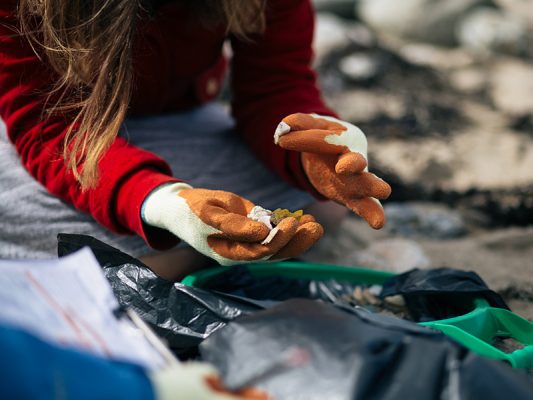Cleaning more beaches could tip the balance when it comes to stopping the plastic tide, says the Marine Conservation Society (MCS) as it encourages more people to sign up to the 25th Great British Beach Clean.
The charity needs volunteers to take part in clean-ups nationwide, and is especially looking for individuals willing to lead a clean themselves between 14-17 September, with the MCS’s support.
During last year’s Great British Beach Clean, just under 7,000 volunteers cleaned 339 beaches and picked up over 255,000 pieces of litter – a 10% rise in the amount of rubbish on UK beaches compared to 2016.
Now, 25 years after the first mass beach cleaning event, the MCS says the UK stands on the cusp of helping make its silver anniversary event the biggest ever.
Plastic pollution in our seas and the crisis the oceans face are no longer under the radar – industry, individuals and governments know that we have to act now to take the momentum started by MCS in 1994 when the charity began collecting beach litter data to fresh heights.
The momentum has been taken to another level over the last 12 months by Blue Planet II, Sky Ocean Rescue and MCS’s own #STOPtheplastictide campaign.
‘Cleaning 339 individual beaches last year was a fabulous achievement by our volunteers,’ says Lizzie Prior, MCS Beach and River Clean Officer.
‘But we know that it’s only the tip of the iceberg. There are hundreds of beaches around our coasts that have never been cleaned and surveyed – and it’s the collection of this data that is so important to getting even more positive changes implemented than have already been achieved in the last year or so.’

Credit: Natasha Ewins
MCS volunteers have cleaned thousands of UK beaches over the last 24 years.
From the Hebrides to Cornwall, Gwynedd to Kent, the charity has recorded just about every bit of rubbish its volunteers have picked up, and used that information to create a sea of change for our oceans.
Reducing carrier bag numbers, a movement to stop plastic straws being handed out in their thousands, clearer labelling on wet wipes and proposed deposit return systems – all have been made to happen thanks to volunteer beach cleaners.
The single-use plastic carrier bag charge across all the home nations has resulted in a 28% drop in the number of bags found on UK beaches.
Microbeads in personal care products have been banned in the UK and manufacturers and retailers have made wet wipe labelling clearer, and cut out their plastic content.
High Street bars, and restaurants and smaller independents have banned plastic straws in their hundreds.There’s a growing momentum to see a tax on plastic ‘on the go’ items, like lids, stirrers and cutlery.
‘The more beaches we have litter data for, the clearer the picture we will have of where it all comes from and what needs to be targeted next,’ says Lizzie Prior.
‘We would love to see well over 500 beaches cleaned this year. If you live near a beach or have a favourite that you regularly visit, why not show it some love and organise a beach clean and survey. It’s really simple and the data you collect could result in further legislative change to help our oceans breathe plastic free.’
For more information visit the Marine Conservation Society website.




